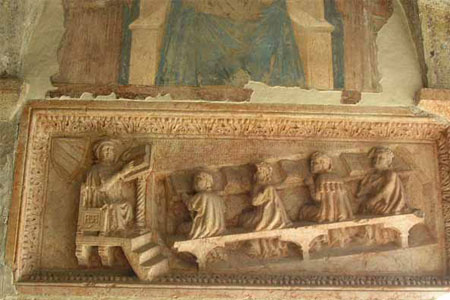Course not running

- Course code
- 4S00003
-
Name of lecturer
-
Chiara Leardini
- Coordinator
-
Chiara Leardini
- Number of ECTS credits allocated
-
6
- Academic sector
-
SECS-P/07 - BUSINESS ADMINISTRATION AND ACCOUNTING STUDIES
- Language of instruction
- Italian
- Location
- VERONA
- Period
-
1° periodo di lezioni dal Sep 28, 2020 al Dec 14, 2020.
Lesson timetable
Go to lesson schedule
Learning outcomes
The teaching has the aim to achieve: - the ability of analysis and understanding of the fundamental mechanisms of operation of the phenomenon firm, of the characteristics of it’s operations, of the logics of the management of the enterprise, formalities of synthesis and communication of the result of the management; - the ability to plan in writing and oral form matters connected to the operation of the economic and managerial phenomena, individualizing application solutions, through correct lines of rea-soning and arguments, with acquisition of an appropriate disciplinary and specific lexicon, abil-ity to formulate autonomous judgments on concrete cases, a method that allows the continu-ous learning and updating of the knowledges.
Syllabus
PROGRAM REWARDING 5 OR 6 CREDITS
The course will be developed through front lessons.
Firms: Different sciences. Individualizing sciences. Generalizing sciences. Empirical sciences. The need. The concept of economic asset. The problem of convenience. The Political economy and the Business economy. The firm. The development of business activity. Classification of companies. Firms and economic risks.
Enterprise: The concept of business. Subjects of enterprise. Groups. The holding. The evolution of the concept of enterprise.
Administration: The operation of the enterprise. Administrative functions. Productive functions. Business functions.
Management: Schemes of the management cycle. Credits. Phases of the management cycle. Managerial functions.
Organization of firms: The concept of business organization. Parts of the organization. Mechanisms of coordination.
Organizational configurations: Detection of management results: Detection of results. Enterprise quantities. Enterprise abstract quantities.
Aspects of the management: The analysis. The monetary aspect and the monetary balance. Economic aspects and the economic badget. The break-up of the exercise. Break-even point. Financial aspects and the financial budget of exercise. The general balance.
PROGRAM REWARDING 10 CREDITS (INTEGRATIVE COMPARED TO THE PREVIOUS PROGRAM)
Operating income: The concept of competence. Procedures for the determination of the operating income. Economic components of the income. The income and the financial management. Operating income and monetary budget.
Assets: The capital and the management. The particular configurations of the capital. Operative capital. Relationships between operative capital and economic capital.
From accounting to financial statement: Nature of the accounts. Cash accounts. Economic accounts. Construction of financial statement. From the business and economic budget to the financial statement for civil law purposes.
RECOMMENDED TEXTS:
G.B. ALBERTI, Elementi di Economia Aziendale. Dalla gestione al bilancio, CEDAM, Padova, 2002, particularly:
For the achievement of 5 or 6 credits from chapter 1 to 7 included (‘till page 146);
For the achievement of 10 credits from chapter 1 to 10 included (‘till page 281).
Reference books
| Author |
Title |
Publisher |
Year |
ISBN |
Note |
| G.B. ALBERTI |
Lineamenti di Economia Aziendale. Dalla gestione al bilancio.
|
CEDAM - Padova |
2002
|
|
|
Assessment methods and criteria
Examination will be carried out through a written test represented by a multiple-choice exam and it will be followed by an oral test. It’s functional to verify the comprehension of the basic principles of business administration.
There are not different formalities of examination between attending and not attending students.
ERASMUS students
ERASMUS students are invited to contact the teacher responsible at the start of the course in order to be set a specific topic to be analysed in greater depth in a course essay. That essay will then be the object of an oral discussion in the examinations scheduled within the academic calendar.







